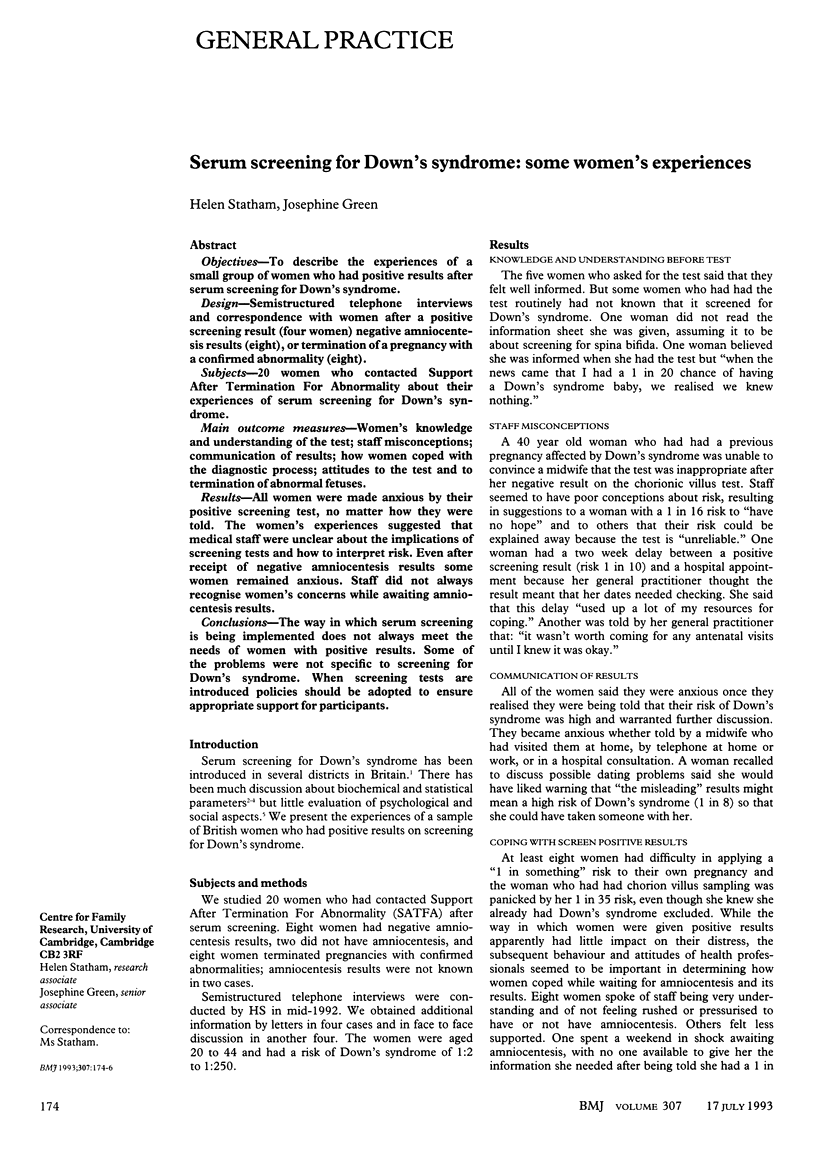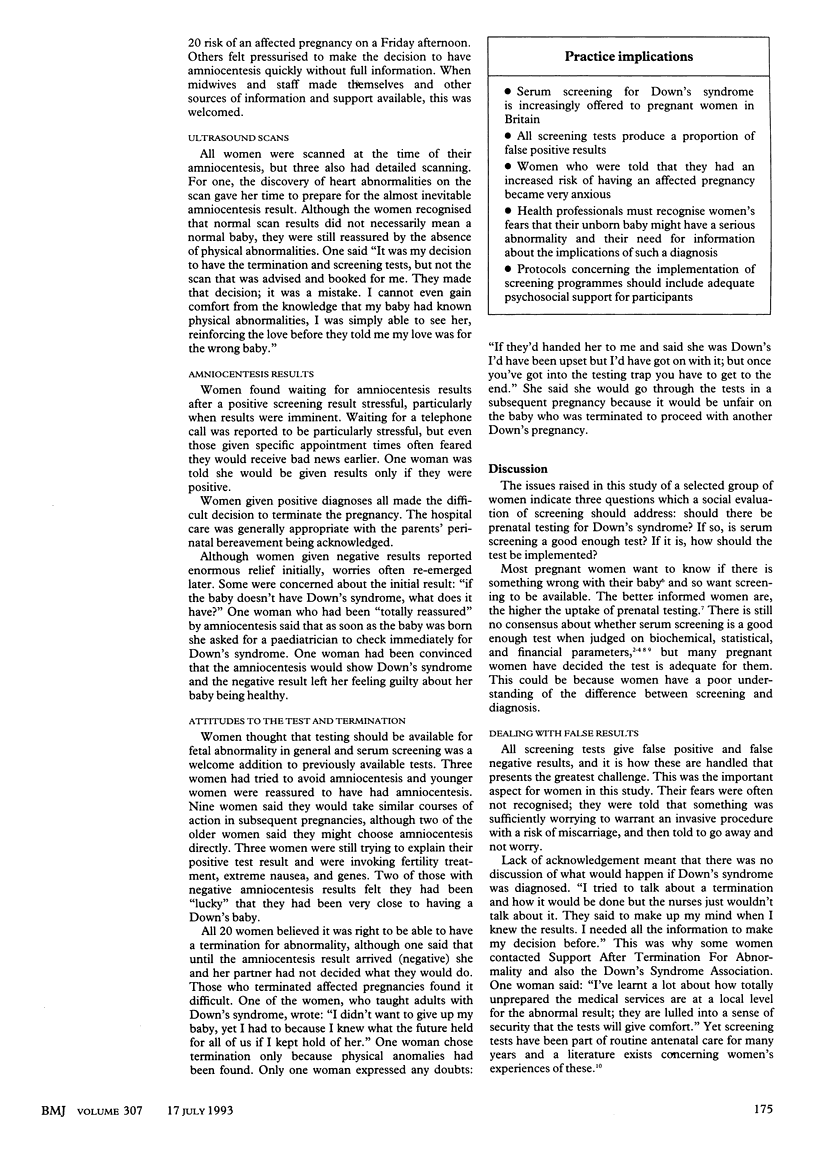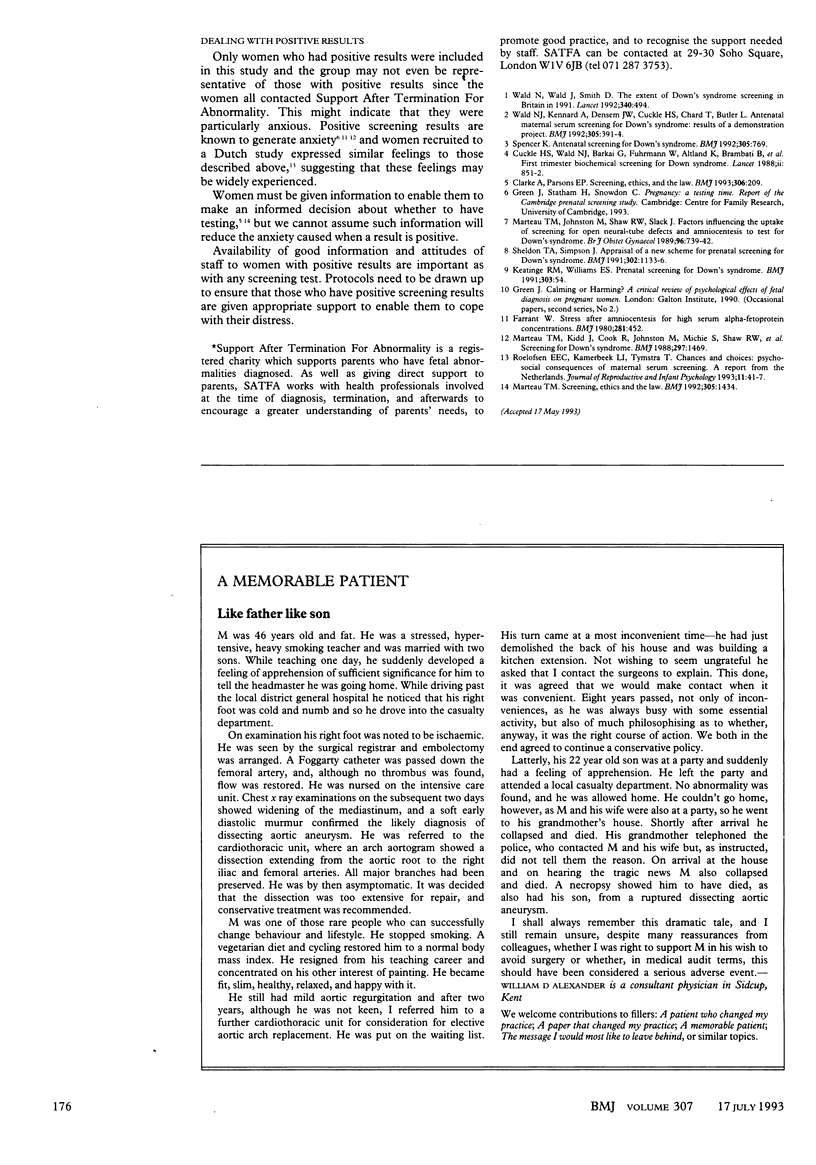Abstract
OBJECTIVES--To describe the experiences of a small group of women who had positive results after serum screening for Down's syndrome. DESIGN--Semistructured telephone interviews and correspondence with women after a positive screening result (four women) negative amniocentesis results (eight), or termination of a pregnancy with a confirmed abnormality (eight). SUBJECTS--20 women who contacted Support After Termination For Abnormality about their experiences of serum screening for Down's syndrome. MAIN OUTCOME MEASURES--Women's knowledge and understanding of the test; staff misconceptions; communication of results; how women coped with the diagnostic process; attitudes to the test and to termination of abnormal fetuses. RESULTS--All women were made anxious by their positive screening test, no matter how they were told. The women's experiences suggested that medical staff were unclear about the implications of screening tests and how to interpret risk. Even after receipt of negative amniocentesis results some women remained anxious. Staff did not always recognise women's concerns while awaiting amniocentesis results. CONCLUSIONS--The way in which serum screening is being implemented does not always meet the needs of women with positive results. Some of the problems were not specific to screening for Down's syndrome. When screening tests are introduced policies should be adopted to ensure appropriate support for participants.
Full text
PDF


Selected References
These references are in PubMed. This may not be the complete list of references from this article.
- Clarke A., Parsons E. P. Screening, ethics, and the law. BMJ. 1993 Jan 16;306(6871):209–209. doi: 10.1136/bmj.306.6871.209-a. [DOI] [PMC free article] [PubMed] [Google Scholar]
- Farrant W. Stress after amniocentesis for high serum alpha-fetoprotein concentrations. Br Med J. 1980 Aug 9;281(6237):452–452. doi: 10.1136/bmj.281.6237.452. [DOI] [PMC free article] [PubMed] [Google Scholar]
- Marteau T. M., Johnston M., Shaw R. W., Slack J. Factors influencing the uptake of screening for open neural-tube defects and amniocentesis to test for Down's syndrome. Br J Obstet Gynaecol. 1989 Jun;96(6):739–741. doi: 10.1111/j.1471-0528.1989.tb03295.x. [DOI] [PubMed] [Google Scholar]
- Marteau T. M., Kidd J., Cook R., Johnston M., Michie S., Shaw R. W., Slack J. Screening for Down's syndrome. BMJ. 1988 Dec 3;297(6661):1469–1469. doi: 10.1136/bmj.297.6661.1469-b. [DOI] [PMC free article] [PubMed] [Google Scholar]
- Marteau T. M. Screening, ethics and the law. BMJ. 1992 Dec 5;305(6866):1433–1434. doi: 10.1136/bmj.305.6866.1433-e. [DOI] [PMC free article] [PubMed] [Google Scholar]
- Sheldon T. A., Simpson J. Appraisal of a new scheme for prenatal screening for Down's syndrome. BMJ. 1991 May 11;302(6785):1133–1136. doi: 10.1136/bmj.302.6785.1133. [DOI] [PMC free article] [PubMed] [Google Scholar]
- Spencer K. Antenatal screening for Down's syndrome. BMJ. 1992 Sep 26;305(6856):769–771. doi: 10.1136/bmj.305.6856.769. [DOI] [PMC free article] [PubMed] [Google Scholar]
- Wald N. J., Kennard A., Densem J. W., Cuckle H. S., Chard T., Butler L. Antenatal maternal serum screening for Down's syndrome: results of a demonstration project. BMJ. 1992 Aug 15;305(6850):391–394. doi: 10.1136/bmj.305.6850.391. [DOI] [PMC free article] [PubMed] [Google Scholar]
- Wald N., Wald K., Smith D. The extent of Down's syndrome screening in Britain in 1991. Lancet. 1992 Aug 22;340(8817):494–494. doi: 10.1016/0140-6736(92)91822-p. [DOI] [PubMed] [Google Scholar]
- Wilkes M. S., Fortin A. H., Felix J. C., Godwin T. A., Thompson W. G. Value of necropsy in acquired immunodeficiency syndrome. Lancet. 1988 Jul 9;2(8602):85–88. doi: 10.1016/s0140-6736(88)90014-1. [DOI] [PubMed] [Google Scholar]


